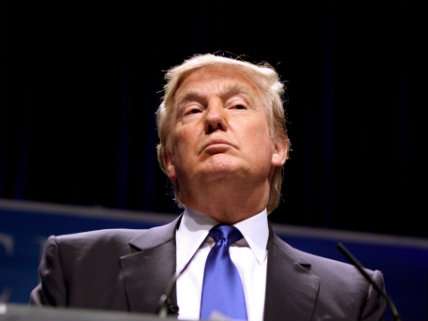Tonight's GOP Debate Is an Experiment: What Does the Republican Race Look Like Without Donald Trump?

With any luck, tonight's GOP debate in Iowa will serve as an experiment of sorts—designed to test the question: What does the Republican primary race look like without Donald Trump?
Since entering the race last summer, Trump has overwhelmed the campaign, making it almost impossible for other candidates to get attention and airtime. Trump has focused the campaign almost entirely on his issues, pronouncements, and candidacy, drowning out substance and policy ideas, particularly on domestic economic policy, that should be part of the primary discussion. These days, when non-Trump candidates talk, they are almost always implicitly—if not explicitly—talking in relation to Trump. He is the axis on which the entire Republican race turns.
And tonight, provided he doesn't change his mind and make a dramatic last-minute entrance (which given Trump's flair for the spotlight, remains an outside possibility), Trump will be gone for the first time, leaving the rest of the candidates to talk amongst themselves.
In theory, that means that we could be in for a calmer, somewhat more substantive debate. Now, I'm not expecting this to turn into a think tank panel, or candidates to pass out white papers during their opening statements. But with Trump gone, the candidates have an opportunity, however brief, to show what they're like in his absence, to demonstrate, if only for a few hours, the kinds of campaigns they wanted to run.
Trump's absence probably represents the biggest opportunity for Jeb Bush, who has consistently come across as flustered by Trump's stage presence, and who spent much of last year rolling out a series of interesting and sometimes reasonable economic policy proposals that almost no one paid any attention to. If Bush wants to show us the kind of campaign he had hoped to run, and the kind of candidate he'd hoped to be, tonight represents his best opportunity in months.
It's an opportunity for candidates like Marco Rubio, Ted Cruz, and Rand Paul—who will be back on the mainstage—as well, to both make their cases and to differentiate themselves from the other Republican politicians on stage without having to worry that everything they say will immediately turn to bounce off of Trump. It's a moment that might allow all the candidates some breathing room and freedom to model what a Trump-free GOP primary would like.
Or at least, that's what it could be, if enough of the candidates decided that's what they wanted, and the moderators decided to play along (or not offer too much resistance). But it's probably not what it will be. After all, Trump remains the party's frontrunner, and his absence is the biggest story going into the debate. He won't be on the stage, but his spirit will loom over the event anyway, and the moderators for Fox News—which has not been shy about criticizing Trump for his no-show—will probably frame many if not most of their questions around Trump anyway, implicitly asking the candidates to take shots at him, to pile on, knowing that he has no way to hit back. Even in his absence, then, his presence will still be felt.
I won't deny that this approach could be entertaining and even satisfying in a way, but it won't be all that instructive. Trump has dominated the GOP race so thoroughly that at this point it's hard to imagine what it would look like without. Tonight's debate offers an opportunity—admittedly an imperfect one—to engage in that fantasy, and even to enact it, if only for a moment.
Indeed, enacting that fantasy may ultimately be the best way to hit Trump where it hurts. His refusal to attend the debate is, like virtually everything he does, a stunt designed to make sure that he remains the center of attention. So ignoring him rather than attacking him might be the more effective approach. If Trump truly doesn't want to take part in this debate, then so be it. Both Fox and the candidates should do their part and leave him out of it entirely.
Check back in later this evening: Reason editors will be live-tweeting both the primetime debate and the undercard.


Show Comments (126)